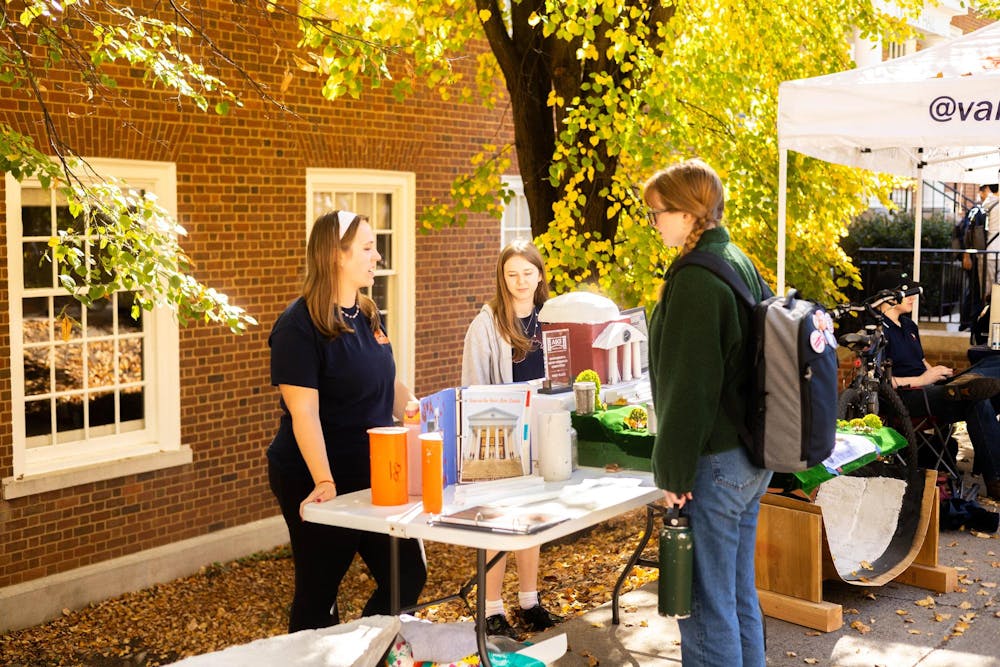The University’s School of Engineering and Applied Science hosted their third annual Engineering Expo Friday afternoon in the Darden Courtyard of Thornton Hall as a part of the University’s Family Weekend. The Expo allowed Engineering undergraduate students to highlight their research projects as a part of Family Weekend, and was organized to highlight undergraduate research and demonstrate different ways in which the School of Engineering supports its students in conducting their research.
Dozens of students, representing all ten of the undergraduate engineering programs the University offers, lined the courtyard prepared to discuss their respective research. According to Lisa Lampe, assistant dean of undergraduate affairs for the School of Engineering and Applied Science, about 80 percent of Engineering undergraduates are involved in research at the University, with many even publishing their research in research journals.
Lampe said the School of Engineering provides several avenues to support students in their research endeavors, including the Dean’s Undergraduate Research Fellowship. This program allows students to continue working on their research projects between the spring and fall semesters, providing them with a stipend while they work at their University lab throughout the summer. According to Lampe, many students featured at the Expo were part of this fellowship.
Second-year Engineering student, Anjini Verdia, who majors in Computer Engineering, is part of the Dean Fellows program. She said she began working in the Learning and Interactive Robotics Lab, which studies the integration of artificial intelligence into robotic systems, at the beginning of the Spring 2024 semester and continued her research full time over the summer.
The research Verdia presented at Friday’s expo focused on enhancing natural language processing models, like Siri and Alexa, for speech recognition in noisy environments. She said she worked with a machine learning model that took in over ten thousand different audio inputs, with everything from a coffee shop to a plane landing pad.
Fourth-year Engineering Student, Takamitsu Suzuki, also presented his research at Friday’s expo. Suzuki is double majoring in Materials Science and Aerospace Engineering, and he works in the Reacting Flow Laboratory, which aims to increase propulsion efficiency while reducing environmental impact.
Under Assoc. Engineering Professor Chloe Dedic, Suzuki said he studies different thermodynamic states, like high temperature and pressure flows, to understand how materials function in scramjet engines of hypersonic flights. Suzuki said experimenting with these thermodynamics allows him to eventually determine the most stable, and best functioning, state for the engine.
One avenue through which undergraduates meet professors to work on research projects with is their courses. Suzuki said he first got involved with Professor Dedic’s research during his third year, when he had a class taught by her.
“I kept showing up to her office hours and showed her my interest,” Suzuki said. “So, in my third year, I was finally able to join the lab and it’s been great.”
Another student who is majoring in Chemical Engineering and has been working on their project for multiple years is fourth-year Engineering student Patrick Boyd. Boyd works on the synthesis and characterization of non natural peptides. Peptides are small proteins all over the human body, and Boyd said that engineering them artificially can have many medical purposes, giving the example of insulin.
In addition to upperclassmen presenting their projects, many first-year Engineering students made an appearance at Friday’s expo. Assistant Engineering Professor Benjamin Goldschneider, who oversees first years as both an advisor and professor, said he began volunteering at the expo last year and that it is a great place for first years to see what kinds of research projects other Engineering students are involved in.
Goldschneider works in the First Year Engineering Center, which is the advising hub for first year Engineering students. He is also an instructor for the first year engineering sequence, a two-semester course sequence combining communications, engineering design, career development and academic advising. Students who take Goldschneider’s Fall class will have him as their embedded advisor.
“First years are welcome to come around, I think it’s an inspirational thing for a lot of them to see what students are doing,” Goldschneider said.







